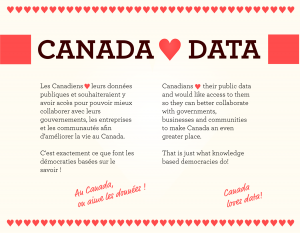Sunday morning musings;
Open Data should not just be raw data in open formats suitably discovered in catalogues, properly described with metadata and available under open licences, interoperable, released under the principle of open government and within government institutions with cultural leanings towards openness and transparency and the rapprochement of citizen and state.
Lets not forget that at the moment, open data is part of the evolution of democratic ideals in liberal minded well off countries. Also, open data are also text, stories, atlases, scientific publications, narrative, journalism, etc. With the popularity of app contests & hackathons, with so few ladies as part of the open data discourse, it seems, we are all not reflecting on who is framing the conversation and the politics behind our actions.
Open data is political and is more than numbers & apps, it is about a cultural change, is is evolutionary and it needs to be considered socially, culturally and politically and situated.
Wot!
I have been thinking about this for a while and this morning it all came together.
Friends have invited me to a passover dinner and the theme is Revolution. I reflected on my favorite line – If you can’t dance you can’t join my revolution (Emma Goldman Living My Life ). I was hoping that Living my Life was in the public domain, so I went looking for a reading of it in Librivox.
In Librivox I discovered this timely gem for the women in Egypt and Libya – The Hypocrisy of Puritanism. Women, as we have seen in Afghanistan, are told that their issues are secondary to the goals of freedom, and in fact, they should set their needs aside for the freedom of the nation. What is the point of a revolution if not freedom for all, if women are not free, then in my mind the revolution has failed – evolution becomes more interesting perhaps for women? Now, with these revolutions in full force women are being stripped searched, gang raped, electrocuted, cattle prodded, undergoing virginity tests by the military, and being threatened with the label of prostitution. Activism for men is political, for women, immoral.
Listening to the reading of this essay on Librivox, written in 1911 reminded me that text is also open data. The words in this essay are as relevant today as they were in 1911 – we just need to change the geography:
The other important author I reflected upon is Erich Fromm, Escape From Freedom.
While I am not as versed in his work as I should be, what I distill from afar, is the notion, that real freedom is actually really hard work, and unless we are continuously critical of what we do and think- very deeply, and are willing to deal with unpopular positions, pointing out the weaknesses in our own discourse and actions, and those of others, then we are not truly free.
Interestingly, for me, who is not Jewish but participating in a modified Jewish tradition, both Goldman and Fromm are the descendants of Jews or are Jewish. Also, both Eastern Europeans who revolutionized our thinking from their new homes in the US.
This week I have been invited as a guest speaker at a Girl Geek Dinner in Ottawa, and some of these readings and listenings may make their way into that discussion.
Thank you Librivox and thank to Hugh who founded Librivox and is also a co-author on this blog!



Comments on Posts